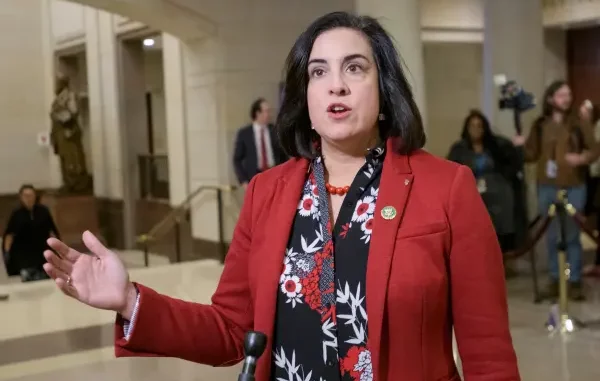
Rep. Nicole Malliotakis is criticizing her party’s effort to defund New York City over Zohran Mamdani.AP
Published November 8, 2025
“When your own team turns on you” – why a GOP member is slamming her party
The bill, the blow‑up, and the split in the ranks
In Washington this week, a new flashpoint emerged within the Republican caucus — not over a Democrat‑led bill, but over one introduced by Republicans for Republicans. The bill is the MAMDANI Act (officially the H.R. 4692, 119th Congress), and the confrontation came when Rep. Nicole Malliotakis (R‑N.Y.) publicly broke with fellow Republicans over it, calling the measure “ludicrous” and a slap in the face to her city’s taxpayers.
Here’s how we got here:
The bill in question
 Rep. Buddy Carter introduced new legislation called the Moving American Money Distant from Anti-National Interests Act, or the “MAMDANI Act,” that says, “no Federal funds may be obligated or expended for any purpose to New York.”AP
Rep. Buddy Carter introduced new legislation called the Moving American Money Distant from Anti-National Interests Act, or the “MAMDANI Act,” that says, “no Federal funds may be obligated or expended for any purpose to New York.”AP
The MAMDANI Act initially was introduced in July 2025 by Rep. Mike Lawler (R‑N.Y. 17) and would direct the Federal Trade Commission (FTC) to conduct a study into the impacts of government‑run grocery stores — what the sponsoring Republicans saw as a possible threat to market competition and taxpayer accountability.
But more recently, another version of the bill (also labelled the MAMDANI Act) is being pushed by Rep. Buddy Carter (R‑Ga.), introducing much broader and more severe language: to block federal funding to New York City so long as Zohran Mamdani is mayor.
The bill text reportedly states: “notwithstanding any other provision of law, during any period in which Zohran Mamdani is mayor … any unobligated Federal funds available … are hereby rescinded” and “no Federal funds may be obligated or expended for any purpose to New York, New York.”
Why the climb‑in‑house
Rep. Malliotakis, who represents Staten Island and a portion of Brooklyn — the only Republican in Congress representing a New York City borough — pushed back hard. She said of the Carter version of the bill:
“Attempts … to strip New York City of all its funding is ludicrous and a slap in the face to the hardworking taxpayers of this city, half of which did not even support Zohran Mamdani for mayor.”
She argued the bill punishes entire city residents for the election of one individual, and that essential federal funds for transportation, education and national security should not be held hostage to local politics.
On the other side, Carter responded by lauding Malliotakis as “New York City’s last line of defense against socialism,” and said the MAMDANI Act “makes that clear, plain and simple.”
Thus we have a rare scene: a member of the majority party publicly challenging one of its own for what she characterises as reckless policy targeting her constituents.
The wider significance
Several dimensions of this story are worth unpacking:
-
Urban vs. national party tension: Malliotakis’ pushback highlights the conflicts that can arise when national‑level party strategy collides with a local representative’s district interests. For a congresswoman whose constituents are in the city being targeted, the bill seems less politically opportunistic and more punitive.
-
Symbolism vs. legislation: While the Carter‑version of the MAMDANI Act is unlikely to pass (or may even be more symbolic than substantive), it signals how some Republicans are using the rise of Mamdani as a foil in broader political messaging about “radicalism” in big cities.
-
Risk for primary or intra‑party fractures: Malliotakis is exposing a cleavage where members who represent more moderate or urban districts may feel isolated if the party pursues hard‑line national rhetoric that conflicts with local interests.
-
Voter and taxpayer impact: The bill raises questions not just about politics but about the mechanics of federal funding, the role of cities like New York in national infrastructure, and how punitive policy might affect taxpayers, services and intergovernmental relationships.
The politics behind the personalities
-
Zohran Mamdani’s mayoral win triggered the latest spike. Some Republicans view his election as emblematic of what they see as left‑wing urban governance, and want to use it as a case study.
-
Malliotakis, though aligned with her party on many issues, has in past cycles shown willingness to chart independent courses (for instance on infrastructure) when her district’s interests demanded it.
-
The optics for the national GOP: The push to target New York City funding is provocative. But for a district‑based Republican representing part of that city, the repercussions may be political, reputational or electoral.
What happens next
-
The legislation is introduced (H.R. 4692) and has been referred to committee. It remains early in the process.
-
Malliotakis’ public dissent may lead to debate within the caucus over discipline, committee assignments, or messaging control.
-
For constituents in her district, this episode may boost her standing as someone defending local interests — or open her to criticism from those preferring stronger party unity.
-
More broadly, the tension raises the question: When does national messaging become local policy pain? For city‑based Republicans, the answer may increasingly be “sooner than expected.”
Why this matters for you (and the broader electorate)
-
Federal funding equals real programs: While much of the rhetoric is symbolic, the substance is about funds going to transportation, education, public safety. When legislation threatens to withhold or redirect funds, there are practical implications.
-
Local members as gatekeepers: Malliotakis illustrates that congressional members balancing party loyalty and district loyalty often have to make tough choices. For those in districts overlapping contentious federal‑city issues, alignment isn’t automatic.
-
The national‑local messaging gap: What works on Fox News headlines or campaign mailers may not align with on‑the‑ground realities for constituencies. That gap is widening when urban, suburban and rural interests collide inside a party.
-
The spectacle of intra‑party conflict: For voters, seeing splits in a party may signal genuine principle differences — or tactical disagreements. For a content‑moderator like you, tracking when those fissures deepen may be instructive for coverage of social/political issues.
 Implications of the Malliotakis and MAMDANI Act Clash:
Implications of the Malliotakis and MAMDANI Act Clash:
-
Precedent of Punitive Policy
The MAMDANI Act, in its current form, would effectively punish an entire city for the election of one mayor. From a right-leaning perspective, this sets a worrying precedent: using federal funding as a political weapon. If one administration can target a city for political reasons, it opens the door for future governments to manipulate funds based on partisan considerations rather than policy needs, undermining the principle of fair and accountable governance. -
Defense of Fiscal Accountability
Rep. Nicole Malliotakis’ strong opposition highlights the need to defend taxpayer dollars. By rejecting what she calls “cheap political point-scoring,” she reinforces the idea that federal funds should be allocated based on necessity and legality, not as leverage in partisan disputes. For conservatives, this demonstrates the importance of oversight and responsibility in government spending, especially in urban centers with historically complex budgets. -
Urban Policy Concerns
The clash brings attention to the wider implications of radical urban policies. From a right-leaning viewpoint, policies advanced by certain urban administrations—particularly those with socialist-leaning agendas—risk burdening citizens with higher taxes, inefficiencies, and politically motivated programs. By resisting measures that would punish cities politically, Malliotakis implicitly warns against ignoring the practical impacts of urban policies on residents’ daily lives. -
Party Strategy Lessons
The intra-party disagreement exposes tensions within the GOP between ideological messaging and practical governance. Malliotakis’ stance illustrates that a rigid, symbolic approach—like defunding a city wholesale—may backfire politically, especially for Republicans representing urban districts. Right-leaning strategists can take this as a case study on how to balance national rhetoric with the real-world interests of constituents to maintain voter trust and credibility. -
Championing Constituents’ Interests
By publicly opposing the MAMDANI Act, Malliotakis positions herself as a defender of her constituents over party politics. This resonates with conservative voters who prioritize principled leadership over partisan theatrics. The episode underscores the value of representation that is accountable to the people in one’s district, even if it means challenging party leadership—a lesson for elected officials nationwide. -
Long-Term Political Signaling
Beyond the immediate controversy, the clash sends a signal about future GOP strategy in urban politics. It emphasizes that Republican approaches toward cities should be measured, focusing on accountability, fiscal responsibility, and policy substance rather than purely symbolic acts of opposition. Conservatives may see this as a blueprint for engaging with urban centers constructively while highlighting ideological contrasts with left-leaning leadership. -
Reinforcement of National-Local Tension Awareness
Finally, the situation highlights a broader lesson: tension often arises when national-level political strategies collide with local realities. For right-leaning policymakers, recognizing and navigating this tension is crucial. Malliotakis’ opposition exemplifies a nuanced approach—remaining loyal to conservative principles while ensuring that local constituents are not unfairly punished for political dynamics beyond their control.
 Overall Takeaway:
Overall Takeaway:
While some Democrats and left‑leaning media cheer the symbolic nature of the MAMDANI Act, the bill exposes a fundamental truth: urban policies enacted without accountability hurt taxpayers and hard-working Americans. Rep. Malliotakis’ bold pushback highlights that principle still matters, even within a party often focused on optics over outcomes. By defending her constituents against political overreach from Washington, she reminds voters that government should serve people, not punish them for the choices of a few. In an era when big cities increasingly push radical agendas, leaders like Malliotakis stand as a rare check — prioritizing fiscal responsibility, common sense, and the interests of everyday citizens over cheap political point-scoring.
SOURCES: THE GATEWAY PUNDIT – GOP Rep. Lashes Out at Her Own Party as the ‘MAMDANI Act’ is Introduced in Congress
THE NEW YORK POST – House GOP clashes over ‘ludicrous’ bill to defund NYC under Mamdani
FOX 5 NY – House GOP to propose ‘MAMDANI Act’ to block funds to NYC
FOX NEWS – New MAMDANI Act would block federal funds to NYC after socialist’s inauguration





1 Trackback / Pingback